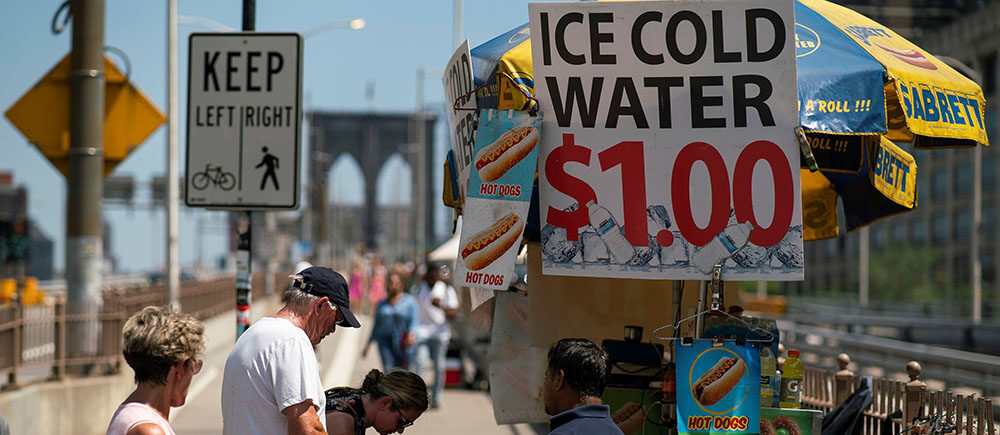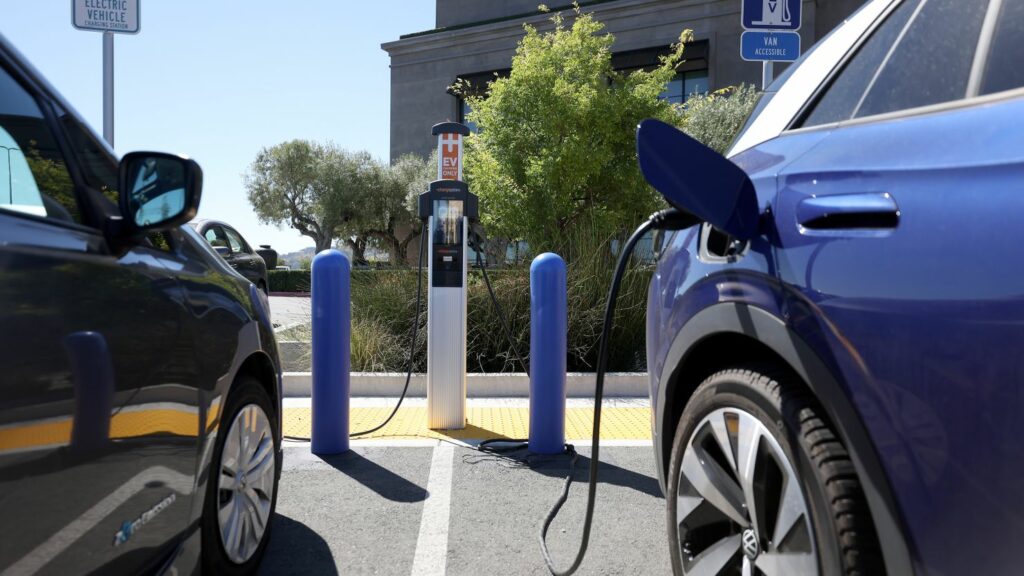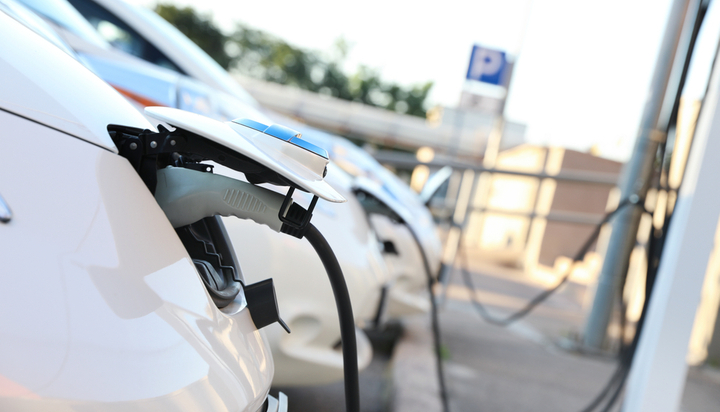As we’ve noted, proponents of drastic measures to stop, reverse, limit and generally de-change climate change are wont to assure us that we won’t have to make significant lifestyle changes. But then they “plead in the alternative” that, just in case, we’d be happier if we did mend our grubby, greedy ways. Thus the new 15-minute cities will give you very few places to park because you didn’t want a car anyway (even of the EV kind) and tough lack of bananas if you struggle with mobility. And it’s not just cars you secretly long to do without; The Times tells us “How to fix global warming? Bring back rationing, say scientists”. And when journalists say scientists say, can activists be far behind?
When it comes to cars, the Lord Mayor of Sydney, Australia, who is the actual mayor not some ceremonial toff, let the roo out of the pouch:
“If we simply swap internal combustion vehicles for EVs we’ll have done more to save the car industry than the planet. That’s why our first priority is creating a city for walking, cycling and public transport – this is the most effective way to reduce emissions from transport. We must improve accessibility while reducing the amount of driving that is necessary.”
Aka possible. Also, people must be made to want the EVs they don’t realize they already want:
“While supply and affordability of these vehicles catches up with demand, the real challenge for us is building a city in which a variety of charging options are available to those who need them.”
Yeah. Catches up with demand. Except not, when it comes to that silly old charging your car so it actually runs:
“People should not expect to charge up wherever they can pull over, in the same way that we don’t expect petrol pumps on street corners at the moment.”
Actually we already have petrol pumps on many corners. However what we really need is social justice on every corner: “Equity has to be central.”
Equity being a word meaning, it seems, Churchill’s old warning about the equal sharing of misery. An article in something called “The Verge,” possibly of a whole new way of life and possibly of mental collapse, tells us we are gobbling our way to incineration: “The food we eat is destroying the climate – here’s how to fix it”. The situation is of course dire and direr:
“The planet has already warmed by about 1.1 degrees Celsius since preindustrial times. That might not seem like much, but it’s the primary driver of more extreme weather and a cascade of other dangerous effects from climate change. Under the current status quo, greenhouse gas emissions from our food system alone could warm the planet by an additional degree. That’s enough to blow past global climate goals set under the Paris agreement and significantly intensify climate disasters.”
As you’ll note, this overheated passage asserts that the “dangerous effects” from climate change are already here, and are about to hit even harder. But they can still be avoided as they time-travel nimbly around we mere mortals:
“Fortunately, there are ways to prevent that grim scenario, according to the research published today in the journal Nature Climate Change. But we’ll have to rethink the way we farm, eat, and handle our food waste.”
It is typical of utopian visions, climate-related and otherwise, that you are not offered some practical thing that has been tested in the real world and found to work. Instead you get to imagine a sweeping “rethink” of the nature of reality itself in which we solve problems with creative wishpower not incentives, tradeoffs and hard work. Which calls to mind Chesterton’s warning that:
“We must see things objectively, as we do a tree; and understand that they exist whether we like them or not. We must not try and turn them into something different by the mere exercise of our own minds, as if we were witches.”
Sorry, wiccans. Mind you they have ways to change our minds based on deep insights like “It is widely accepted in the climate community that human behaviour change is an irreplaceable component of systematic climate actions.” In “a collaboration between Nature Human Behaviour and Nature Climate Change” eerily reminiscent of C.S. Lewis’s National Institute for Coordinated Experiments, we are told that:
“The Earth is heating up fast because of anthropogenic climate change. Global greenhouse emissions continue to rise, while extreme weather events ravage lives, livelihoods and ecosystems. Scientists warn of impending disaster without urgent, decisive action.”
So it’s here now, and about to hit. But it can be stopped if they just get inside our heads and rearrange the rubbish into something less appalling: “policy-relevant behavioural science studies are needed for a shift towards human-centred climate actions.”
In case reimagining the laws of physics, economics and morality and reprogramming the peasants turns out to be a slog, even with handy tips from “Climate Forward” on how to socially engineer ourselves and save the activists the bother, we have to start by giving up what we like. They say “A few food groups in particular are responsible for a whopping 75 percent of that global warming” because they “are high sources of methane, a powerful greenhouse gas that is 80 times more potent than carbon dioxide in the first couple of decades after it’s released.” Boo methane! Down with natural gas! Fire up the coal plants.
No, wait. We don’t need no stinking methane if we just give up stuff we like. “Beef and other ruminant meat… like goats and sheep, are at the top of the list when it comes to causing climate change.” Oh, and “Rice and dairy are next, the other two food groups responsible for a whole lot of methane emissions.” But suddenly it’s all easy again:
“the researchers aren’t asking for anything extreme or even for people to eat vegetarian. Their modeling, which found a 55 percent reduction in the food sector’s contribution to future global warming, is based on people following healthy diet recommendations from Harvard Medical School.”
So you see that you didn’t really want that burger anyway. Plus we get to keep eating meat, just with “residents of more affluent countries reducing their meat consumption”, thus having our burger and renouncing it too. Though members of Toronto City Council were apparently surprised to learn that the “qu’ils mangent des vers” crowd were apparently planning to start by taking away meat from the homeless, plus people in seniors’ residences and daycares, which sounds a bit like picking on the vulnerable as subjects of social engineering while you hang on to your filet mignon until you see how it turns out.
Well, we say burger. But it could be kebab or something because there’s so much pouring forth from this cornucopia in our minds that lead author “and a PhD candidate at Columbia University” Catherine “Ivanovich is quick to say that any changes in diet need to respect cultural traditions.” Unless, of course, your cultural traditions involve you getting to decide for yourself what you’re going to eat.
In any case, you’ll be eating ration coupons especially if you’re British. The Times reports that:
“Second World War-style rationing of petrol, household energy and meat could help to fight climate change, British scientists have recommended…. Their study, published in the journal Ethics, Policy & Environment, noted: ‘Rationing has been neglected as a climate change mitigation policy option.’ It added that rationing was widely accepted in Britain during the conflict, explaining: ‘As long as there was scarcity, rationing was accepted, even welcomed or demanded.’”
So you admit there will be scarcity in your Green New World?
Oh, and the other key steps we’re on the Verge of are to reinvent “how we produce food and treat waste” and “more complex efforts to genetically engineer rice or produce cattle feed that reduces methane emissions.” Just that? Oh no. These measures “need to be balanced with other strategies that get us away from the ‘business as usual’ that got us into a climate mess in the first place.”
Which was driving cars and eating meat, right? Plus having capitalism, believing in reality and all that patriarchal jazz.



My parents regarded rationing in the UK as a nightmare and they both grew up on farms where we could grow a bit extra. But it seems that rationing resulted in much better nutrition for the poor working class kids. So maybe there is something to be said for rationing. Of course it was prolonged much longer in the UK than really necessary because there is no shortage of experts willing to draw a salary to tell other people how to live their lives. Now it would seem that the problem for poor working class kids in UK and Australia is obesity. This seems like such a simple problem that we should get some experts together to develop one or several theoretical models.
Of course, for public transport to work, there must be a sufficient density of routes to serve where people want to go, and they must run sufficiently often, and across enough of the day, to serve the needs of travellers. This inevitably leads to many runs carrying very few, perhaps no, travellers, leading to enormous rates of CO2 emission per passenger-kilometer! Some mitigation is possible by having people book trips, where the bus comes near to them, and only when they want to travel, while peak times run a simplified route with full vehicles.
In San Francisco, Highway 101 was increasingly congested with commuter cars heading towards San Jose snd back, so tech firms started running private buses for their employees, but this had the effect of increasing rents and house prices along the routes, as people preferred to live close to a place where they could use the free, wifi-equipped bus to head to work and back, before working-from-home became a pandemic reality for many, so beware of unexpected consequences...
The thoroughly bankrupt western welfare states are in terminal political, cultural and economic decline and have deemed through their most sociopathic of political "leaders" that through the political mirage of net zero, a salvation elixir for a manufactured crisis, that we are to de-industrialize. Industrialization is the original sin according to the cool kids and the only salvation is through is self flagellation and sacrifice. Meanwhile 4/5 of the world's population is saying no thanks, choosing instead to achieve our level of prosperity and perhaps hopeful that we make ourselves less relevant and existent sooner so they can come and exploit the resources we won't allow ourselves to develop.
It is a huge problem that people of power and influence in our part of the World, not least in isnstitutions of 'learning', appear to have absolutely zero concept of how generally miserable pre-industrial age, i.e. pre-fossil fuel age, life was. These same dangerous morons also do not appear to grasp that they are trying to sell everyone Münchausen's bootstraps - the notion that you can build a fossile fuel-free economy without using fossil fuels. Their ignorance is of biblical proportions.
As to obesity and other life-style illnesses: Terminate across-the-board social healthcare systems (and lower tax expropriation proportionately) and replace it with competing insurance systems where your life-style choices (and perhaps BMI ;-)) determine how costly your premium will be. Simple and fair in concept - perhaps a bit tricky in real life without risking breach of privacy. In short, there are no simple answers to complex problems.